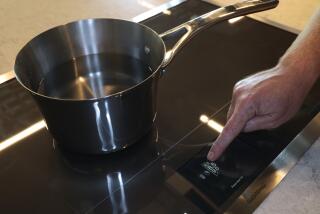A Proper Vent Is Crucial in Replacing Townhouse’s Electric Water Heater With Gas
- Share via
Question: Our townhouse has a gas range, furnace and fireplace, but the water heater in the garage is electric. I’ve been told it was probably done this way because there was a problem in creating a vent for a gas water heater from the garage. Would this really be a hard thing to do? I think it would really reduce our electric bill to convert to a gas water heater.
S. I.
Huntington Beach
Answer: “As long as there are gas lines you can tap into in the garage and as long as you can find a way to route a vent that will meet the building codes, you’re OK. But you may have a problem with the homeowner’s association regulations,” says Rod Albright of Albright Plumbing and Heating in Los Alamitos. “Although you may create a vent that conforms to code, if it’s unsightly you’ll have to convince your neighbors to your way of thinking.
“Electric heaters are not as efficient as gas. Their recovery rate, or the time it takes for an electric heater to warm up water, is longer than with a gas heater. If you can show your association that everyone could benefit by getting a gas heater, you might win your case a little easier.”
Q: I’ve got vinyl rain gutters that are about seven years old around my house, and I noticed that during our spring rains, they were leaking at various points. How can I patch them and what do I use?
H. N.
Westminster
A: “Try using one of those epoxy repair kits that are designed for plastic products,” says Claude Bradley of Canning’s Brea Hardware. “Basically, you just have to get up there on a ladder and clean off the area you’ll be patching. You also might want to lightly sand it to help the epoxy adhere. Mix the two elements and apply it to the area. Let it dry according to the directions before testing it by running water down the gutter from a garden hose.”
Q: We’re considering having a hardwood floor installed in our kitchen, and we’ve heard that teak is the best you can get, since it’s strong enough to be used on boats and it needs little maintenance. Is that the case?
C. H.
Yorba Linda
A: “Teak floors are very beautiful, but they’re soft, which is why they’re not always a great choice for kitchens,” says Mike Chamberlain of Chamberlain Floors in Fountain Valley. “In the kitchen, pots and pans tend to be dropped, and that can create a nick or dent in a teak floor. And high-heeled shoes will also leave marks. If you don’t mind the surface being uneven, it may work for you. As far as maintenance, like any other wood, teak needs a sealant, and it needs to be cared for.”
Q: I have some expensive electronic equipment, and I’m worried about the electrical outlets in my 35-year-old house. How can I tell if they’ve been properly grounded?
M. C.
Santa Ana
A: “That’s easy to check with one of those inexpensive units you can get from almost any hardware store that plug into the outlet and indicate if there are any problems,” says Robert Garcia of Ganahl Lumber in Anaheim. “They can tell you if the connections are good and if it’s properly grounded without having to take the outlet apart.”
Q: I want to build a sauna in our back yard myself, but after pricing the wood that’s usually recommended for that, cedar, I’m wondering if there’s a less expensive wood I can use that will hold up?
T. Y.
Anaheim
A: “Unfortunately, you’re going to have to go with either cedar or redwood,” says carpenter Phil Hansen of Santa Ana. “Neither is particularly inexpensive. I’ve seen saunas that were built with pine in which the wood cracked and warped because of the moisture and humidity. Cedar and redwood seem to have the right properties to hold up to those kinds of conditions.”
More to Read
Sign up for Essential California
The most important California stories and recommendations in your inbox every morning.
You may occasionally receive promotional content from the Los Angeles Times.










